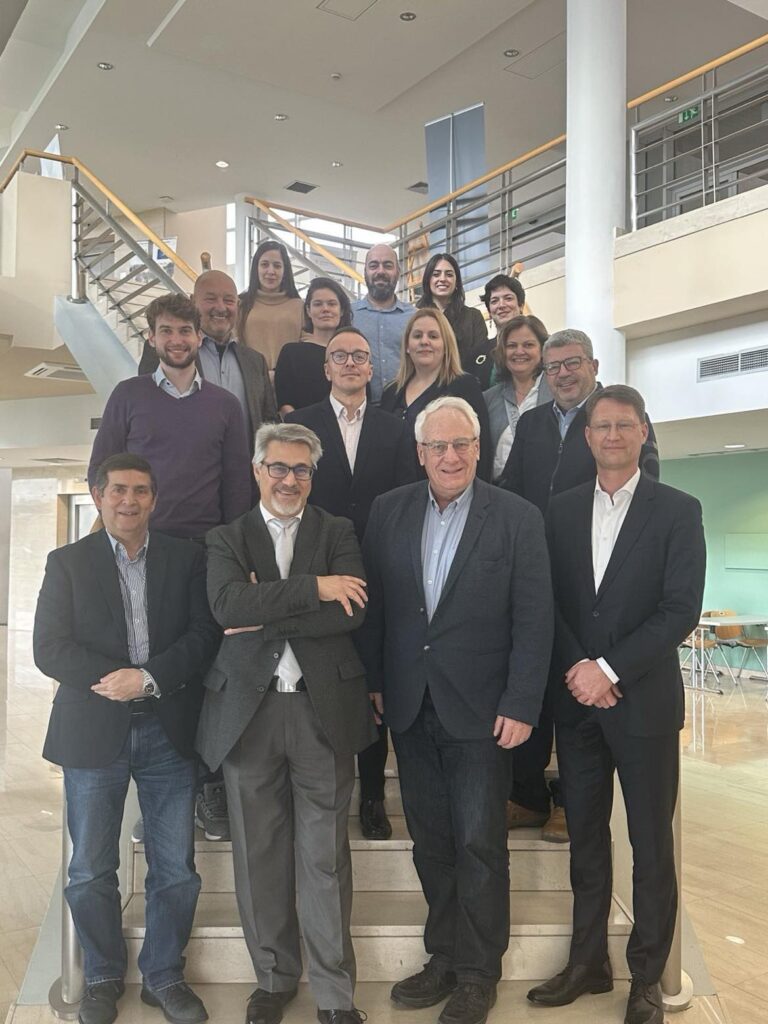
The third Periodic Review of the CY-Biobank Project, which is carried out by the Center of Excellence for Biobanking and Biomedical Research biobank.cy of the University of Cyprus and is funded by the European Commission, the Cyprus Republic and the University of Cyprus. The third Periodic Review was carried out at the Siakoleio Clinical Medicine Training Center, by external auditors and evaluators.
The European Commission/REA was represented by Dr. Elisabet Salas (Research Program Administrator), while Professor Milan Macek (Charles University Prague, Department of Medical Genetics, School of Medicine, and Johns Hopkins University School of Medicine) attended as External Observers/Independent External Experts. and Professor Joan Xavier Comella Carnice (Director of the Institut de Recerca Sant Joan de Déu, and Director of Research, Innovation, and Learning at the SJD Barcelona Children’s Hospital, Barcelona, Professor of Cell Biology – Universitat Autònoma de Barcelona).
The Project Partners from the University of Cyprus, the Medical University of Graz, the European Biobank Research Infrastructure BBMRI-ERIC and the company RTD Talos Ltd took part in the meeting.
The two-day event was prefaced with greetings by Dr. Maria Pantelidou, Senior Officer at the Deputy Ministry of Research, Innovation and Digital Policy, the Rector of the University of Cyprus, Professor Tasos Christofidis, and the President of the Center’s Council, Mrs. Elena Tanou.
In her speech, Dr. Pantelidou emphasized the importance that the Deputy Ministry of Research and Innovation attaches to the seven Centers of Excellence operating in Cyprus and especially to biobank.cy which maintains the country’s large biobank, while the Rector of the University of Cyprus, Professor Tassos Christofidis praised the importance of the Center for the promotion of health in the Cypriot population. The Chancellor commented positively on the fact that the three Directors of the Centers of Excellence hosted by the University of Cyprus,
including biobank.cy, have been included in the Stanford University list, among the top 2% of scientists worldwide, whose work has an international impact. He also emphasized that the University’s support for the Center is manifested in various ways, including additional funding for the acquisition of a separate building. Finally, Ms. Tanou emphasized the scientific and social as well as diplomatic role that the CY-Biobank Project and by extension the Center of Excellence have to play.
For his part, Professor Constantinos Deltas, Director of the biobank.cy Center of Excellence, welcomed the participants to the meeting and mentioned, among other things, that the operation of the Biobank is a great innovation for Cyprus, which creates the conditions for the Next generation biomedical research. He also announced the first edition of the Centre’s proceedings covering the first four years of its operation, in which the various departments and activities are described as well as the first useful results from the utilization of archived material and data.
Subsequently, the managers of the Project Work Packages presented the achievements of their teams during the third Periodic Review, receiving a positive response from the evaluators and constructive suggestions concerning the future of the Project.
In a short period of time, the Center intends to organize a relevant event with the aim of presenting its achievements and future goals to the wider scientific community and society.
The ambition of the biobank.cy Center of Excellence is the production of new knowledge for the improvement of human health and its contribution to the prevention, diagnosis, prognosis and treatment of diseases, with the aim of Cyprus facing the new challenges related to translational research and in precision medicine. At the same time, the CY-Biobank project aims to study the Cypriot human genome, generating knowledge that will serve as a reference tool for many other research programs that will study rare single-gene disorders or more often complex diseases with multifactorial etiology.
Find more about the Center’s activities below:
